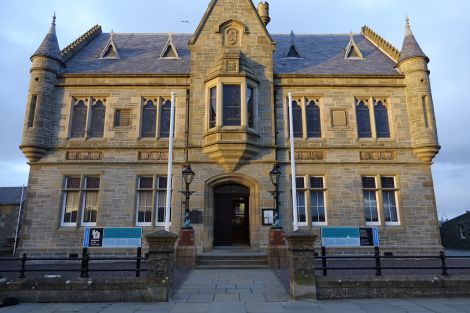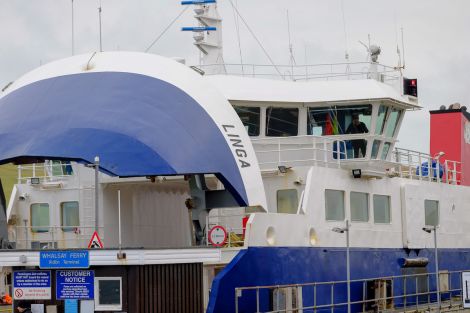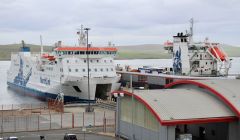Council / SIC facing more than £1m in additional costs as coronavirus impacts finances
The council estimates it is on course to lose £1.6m in income over the space of four months
SHETLAND Islands Council (SIC) is facing additional costs of at least £1.2 million for the four months between March and the end of June as coronavirus impacts the local authority’s finances.
The estimated net figure is a melting pot of increased costs, loss of income and potential savings.
SIC finance manager Jamie Manson confirmed that the council is in line to receive £1.2 million in emergency local authority funding passed on to the Scottish Government from Westminster as part of a £155 million payout.
“This funding will go towards meeting the pressures we’re facing up to June, but it won’t meet all of the additional costs we’re facing,” he said.
SIC leader councillor Steven Coutts warned that “more will be needed” from the Scottish Government.
While some savings have been made due to services being stopped or reduced and buildings being shut, there has been a significant loss of income as well as extra spend in certain areas.
Manson said there is an estimated loss of income of £1.6 million from March to June – around £345,000 of which is associated with the closure of premises such as schools, the library and Islesburgh Community Centre.
He said there is an estimated £336,000 of additional costs that relate directly to the council’s response to the pandemic, which has included spend in areas like key worker childcare, the provision of free school meals, staff overtime, ICT equipment and cleaning supplies.
There are expected savings, however, of around £1 million. Closing buildings has contributed to an estimated reduction in energy costs of £500,000, while there is also a £360,000 saving in fuel, mainly as a result of the inter-island ferries running to a reduced timetable.
Become a member of Shetland News
The net pressure on the SIC is expected to reach at least £1.2 million by the end of June and potentially £1.5 million by the end of the July.
As of 28 May the SIC had physically received around £6.3 million from the Scottish Government, but the majority of this has been provided to facilitate payments under the coronavirus business support scheme.
“We have confirmation of funding allocations for the remainder of funding not yet received, which we expect to be made available to us in the coming months,” Manson added.
A significant hit on the council is income from charges and fees which is not being received due to services not operating as usual. Among the main areas of lost income are:
– Roughly £345,000 lost income from closure of premises – including schools, the Islesburgh community centre, library etc. The SIC also faced £19,000 of one-off costs associated with cancelling school trips
– Around £150,000 of lost income from commercial and special waste collections, skip hire, scrap metal disposal and food hygiene and health certification
– Approximately £200,000 of lost income from inter-island ferry fares due to the restricted service and substantial reduction in people travelling
– Around £300,000 of lost income from quarry sales
– Roughly £100,000 of lost income from planning and licensing fees
– About £110,000 of lost income from fish landing fees in Scalloway, and £60,000 of lost income from harbour dues.
In addition to reduced energy and fuel costs, the SIC has also saved around £120,000 in not providing school meals, while it would have usually racked up £22,000 worth of travel expenses from March to June.
The council is currently working to assess the likely financial impact on the 2020/21 budget and this information will be available at the end of June or early July, Manson added.
He said the situation is being closely monitored but it has not been possible to model the potential impact for the remainder of the financial year due to the uncertainty around how long restrictions may remain in place.
The SIC will be looking for the additional costs to be covered by the Scottish Government.
“We’re currently working to understand the impact might be for the rest of the year,” Manson said.
“We fully expect we’ll be facing additional costs beyond the end of June and expect we will see reductions in income over the coming months.
“It’s quite tricky to determine what the impact might be when we have the prospect of restrictions being eased or re-introduced, which obviously influence which services, and to what extent, can resume operations.
“We know the council’s normal service will not resume overnight, so we will certainly be looking to the Scottish Government for further support as we continue to deliver services, implement Scottish Government policies and move into the next phase of the response, towards recovery and renewal.”
SIC leader Coutts said the initial funding from the Scottish Government was designed to cover immediate costs, with more needed in the future.
“There will still be significant costs to the council as we move to introduce services as restrictions are eased,” he said.
“For example we need to manage the return of schools and the impact of distancing will bring significant cost implications.
“Through [local government association] COSLA we are pressing government for these additional costs to be recognised. Our levels of generated income will not be what we projected when we set our budget.
“We will continue to lobby that government to provide the level of funding needed.”
Become a member of Shetland News
Shetland News is asking its readers to consider paying for membership to get additional perks:
- Removal of third-party ads;
- Bookmark posts to read later;
- Exclusive curated weekly newsletter;
- Hide membership messages;
- Comments open for discussion.
If you appreciate what we do and feel strongly about impartial local journalism, then please become a member of Shetland News by either making a single payment, or setting up a monthly, quarterly or yearly subscription.




















































































